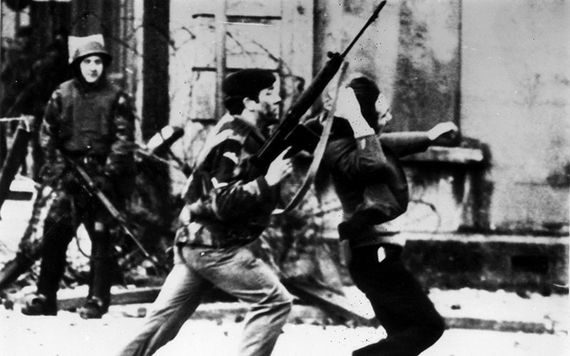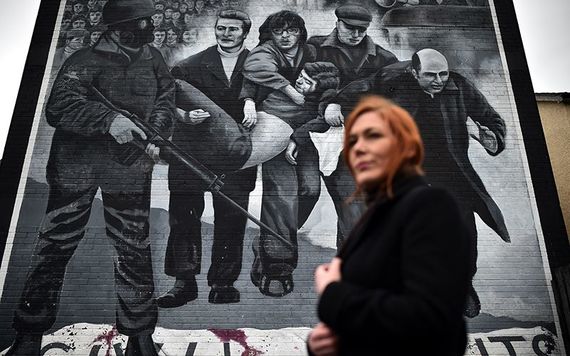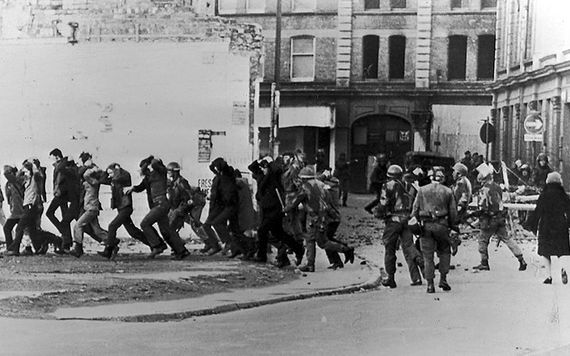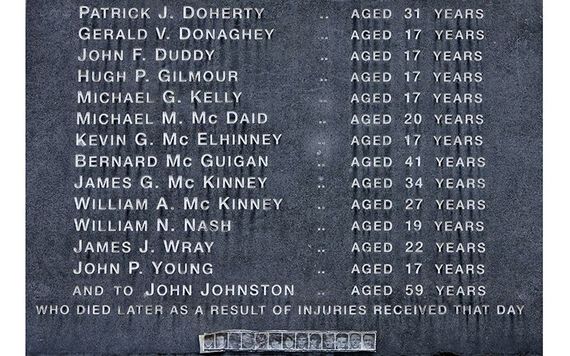There was bitter disappointment last week among the relatives of the 13 people killed in the Bloody Sunday massacre at the decision that only one of the soldiers involved is to face court for murder
The reality is, however, that no other decision was possible. And the decision to charge even that one soldier is problematic for several reasons.
Read more: Bloody Sunday soldier told to "get some kills" murdered at least four civilians
The most obvious problem is the passage of time -- it's now 47 years since the events of that awful day in Derry in January 1972. Seventeen of the soldiers who were involved are still alive, but they are mostly old men in their seventies.

A British soldier and civil rights protester on Bloody Sunday.
Based on the findings of the Saville Inquiry, the families of the victims had hoped that three or four of the soldiers most directly involved in the killings would face trial. But in the end, the Director of Public Prosecutions (DPP) in Northern Ireland decided that only one soldier could be prosecuted. The DPP's decision was based on the results of the police investigation which has been ongoing in recent years, following the end of the Saville Inquiry in 2010.
The first thing to remember is that evidence given during the Saville Inquiry cannot be used in court. Saville, which ran for 12 years and cost nearly £200 million, heard evidence on the basis of a guarantee that anything that was said could not be used in a subsequent trial.
Since the aim of the Saville Inquiry, which followed the discredited Widgery Tribunal, was to uncover the full truth of what had happened on Bloody Sunday, that was understandable. The guarantee was aimed at allowing those involved to speak freely without fear of prosecution.

A family member of a victim stands before the iconic Bloody Sunday mural in Derry.
But it had consequences, the most important being that, after Saville, the prosecution service in Northern Ireland had to start from the beginning in assembling evidence four decades after the event.
Given the passage of time, the lack of forensics from the day, the loss of evidential material, and the death of participants and witnesses over the intervening decades, the task of assembling evidence at this stage that will stand up in court was extremely difficult. The DPP does not bring a case unless there is a reasonable chance of success.
Only in the case of one soldier -- that of Soldier F who was identified during Saville as the killer of several people on Bloody Sunday -- was evidence that could be produced in court considered strong enough to warrant bringing him to trial.
It is by no means certain that the case will succeed. In fact, there are numerous reasons why it may fail, mostly to do with the long period that has elapsed since 1972, the reliability of witness memory after so long and the shortage of physical evidence. Remember the case has to be proven "beyond reasonable doubt."

Civil rights protesters carrying a victim off the streets on Bloody Sunday.
That said, it is absolutely correct that this case is being taken. Murder is murder, whether the perpetrator is a soldier or not.
There is a wider context to all this, of course, which makes it reasonable to question why Soldier F will be the only one in the dock. He was part of the Parachute Regiment, British Army shock troops who were completely unsuited to and untrained in the crowd control needed in Derry on the day.
The Paras had already shown how ruthless they were in the Ballymurphy massacre in Belfast just months earlier. After that, why are those who deployed them in Derry and those in command on the day not being charged with anything?
Unlike Widgery, the Saville report made it clear that the Paras had not been shot at before they opened fire on Bloody Sunday and that the victims were unarmed (although Saville found that one teenager had probably been carrying nail bombs when he was shot). It also established that there were two armed IRA men in the vicinity who fired shots on the day. The level of threat perceived by the Paras during the incident is likely to be a key part of this case.

The British military forcing protesters off the streets.
There is also the more fundamental question of whether soldiers should be charged for their actions in what they may have perceived, even if they were completely wrong, as a combat situation. Going down that road is difficult and there are well known examples of how unfair it can be, involving not just British troops, but U.S. troops, and others, often in unfamiliar situations in overseas conflicts.
No one can justify the appalling behavior of the Paras in Northern Ireland at the time. But it is important to remember that the British Army was there to try to keep the peace in a highly volatile situation, not with the intention of killing innocent people.
It is also important to remember that this was a time of very high tension in the North, the beginning of the worst of The Troubles with bombings, shootings and widespread carnage, much of it directed at killing as many of the security forces as possible. The Paras themselves paid a heavy price then and a few years later at Warrenpoint.
One can understand the anguish of the families of the Bloody Sunday victims at the decision announced by the DPP last week. The Bloody Sunday massacre has become so iconic they have been led to believe that the killing of their loved ones is a special case. And they have been encouraged in this belief by Sinn Fein over the years.

The names of the 14 Bloody Sunday victims.
But the truth is there are numerous horrific legacy cases from years ago, many perpetrated by the IRA, that have never been prosecuted and never will be.
Bloody Sunday was followed a few months later in July 1972 by Bloody Friday, for example, when the IRA set off over 20 bombs in Belfast killing nine people (five of them civilians) and injuring 130. Just 10 days after that three bombs were set off by the IRA in the village of Claudy in Co. Derry killing nine civilians and injuring 30 in an attack which became known as Bloody Monday.
Does anyone think that the families of those who died or were injured in those other "Bloody" days have been able to forget what happened? Yet they are expected to draw a line over the past and move on for the sake of the peace.
The point is that no one -- least of all Sinn Fein -- can claim the moral high ground in relation to all that happened during the 30 years of The Troubles in Northern Ireland. Too much water and blood has flowed under too many bridges for that.
The price of peace, as we all know, was that much of this bloody history was buried to enable the Good Friday settlement. IRA men on the run were given letters by the British government guaranteeing them they would not face justice.
Known killers from both the republican and loyalist sides were given early release from prison. Others were quietly told they would never be charged. In effect, killers on all sides were given pardons.
One can argue that this was the price of peace and that it was worth paying. The peace we have had since then supports that. But it does not make it any easier for the families of those who died during the years of carnage to see those they know were responsible now enjoying their new lives as community workers (paid with state money) or even as respectable politicians.

The murals that remain in Bogside, Derry.
The point of all this is that is that no one has the monopoly on victimhood in the sorry history of Northern Ireland. Sincere and hurt as they are, that is as true for the families of the Bloody Sunday families as it is for all the other quietly grieving families in the North.
The clueless Secretary of State for Northern Ireland, Karen Bradley, was not just insensitive but wrong when she said recently in the House of Commons that the soldiers on Bloody Sunday were not committing crimes but trying to do their duty as best they could in a difficult situation. In the case of Soldier F that is for a court to decide, not her.
She was right, however, to remind people that the vast majority of the 3,637 killings during the Troubles in Northern Ireland were carried out by paramilitaries, 60 percent by republicans (mainly the IRA), 30 percent by loyalists and the remaining 10 percent by security forces. And it is also worth remembering that more than 50 percent of those who were killed were civilians (largely due to the IRA) and around 30 percent were army and police who, as Bradley said, were trying to keep the peace.
Soldier F deserves to be put on trial, if what we heard about him in the Saville Inquiry is true. But there are many, many more who should be up there in the dock with him.
Read more: Two men arrested on suspicion of manslaughter after three teens killed in Paddy's Day "crush"




Comments